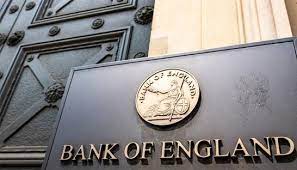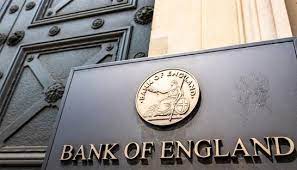
According to the results of Reuters’ poll, the Bank of England will continue its tightening cycle next month as red-hot inflation remains well over the goal and the economic threat posed by the Omicron coronavirus variation should be less severe than prior mutations.
Last month, the Bank of England became the first major rate-setter to raise interest rates since the start of the coronavirus outbreak, shocking markets and many analysts who had expected a delay.
Even as the Omicron variant swept Britain, the central bank claimed it had to act because it detected warning indicators in underlying inflation pressures.
Inflation, which hit a near 30-year high in December, will peak next quarter before starting to fall in the third quarter, according to the poll, and it won't meet the Bank of England's 2 per cent target until the second quarter of next year, putting further pressure on the central bank to act.
In the most recent poll, which was issued on Friday, median inflation expectations for this quarter and next surged to 5.2 per cent and 5.5 per cent, respectively, from 4.7 per cent and 4.6 per cent in December.
"Inflation has surprised higher, again, and that's only likely to increase the temptation for Bank of England policymakers to hike rates for a second consecutive meeting this February," said James Smith at ING.
The BoE's main interest rate is expected to rise to 0.50 percent next month, according to market expectations.
In April, British customers will face an estimated 50% increase in energy expenses, as well as an increase in social security contributions.
More than 65 per cent of respondents who participated in the Jan. 17-20 survey anticipate a 25-basis-point rate hike in rate by the Bank of England when its Monetary Policy Committee meets on Feb. 3, up from 0.25 per cent, while more than 75 per cent of the participants expect a rise to 0.50 per cent by the end of March.
According to median projections, the Bank of England will raise its main interest rate by another 25 basis points in the third quarter, a quarter earlier than projected last month, but it will not raise it again until early next year, to 1.00 per cent, which is also earlier than expected.
When asked how high that rate will rise in this cycle, the median answer was 1.50 per cent, which is still historically low.
According to another Reuters poll, the Federal Reserve will raise interest rates three times this year.
Official figures released last week revealed that Britain's economy surpassed its pre-pandemic size in November, though some of that momentum was likely lost as people stayed home ahead of the holiday season to ensure they were healthy for Christmas celebrations.
According to Springboard data, the number of shoppers in downtown London on Christmas Eve was 30.3 per cent lower than the previous Friday.
According to the survey, economic growth dropped to 0.6 percent this quarter after rising by 1.0 per cent at the end of 2021. The following quarter, it will expand by 0.9 per cent before slowing to 0.7 per cent and 0.6 per cent in the following two quarters.
GDP growth is expected to be 4.5 per cent in 2022, and 2.2 per cent in 2023, according to a poll of 66 economists. Last year, the economy grew at a faster-than-expected 7.0 per cent.
Prime Minister Boris Johnson, who is facing mounting calls to resign over a number of scandals, used a light touch in dealing with Omicron, refraining from applying the harsh rules that were in place during the previous waves of the pandemic.
He announced the lifting of most COVID-19 restrictions on Wednesday.
When asked how the Omicron variant would affect the economy in comparison to the Delta variant, all but three of the 24 people who responded to a follow-up question stated it would be "far milder."
"As we head into the spring I imagine confidence will be supported by the fact COVID-19 cases will be somewhat lower and we have an entire economy of people who want to go out and spend money," said George Buckley at Nomura.
"It suggests we will see an increase in consumer spending, particularly services spending, as we stop buying stuff and start buying experiences."
(Source:www.reuters.com)
Last month, the Bank of England became the first major rate-setter to raise interest rates since the start of the coronavirus outbreak, shocking markets and many analysts who had expected a delay.
Even as the Omicron variant swept Britain, the central bank claimed it had to act because it detected warning indicators in underlying inflation pressures.
Inflation, which hit a near 30-year high in December, will peak next quarter before starting to fall in the third quarter, according to the poll, and it won't meet the Bank of England's 2 per cent target until the second quarter of next year, putting further pressure on the central bank to act.
In the most recent poll, which was issued on Friday, median inflation expectations for this quarter and next surged to 5.2 per cent and 5.5 per cent, respectively, from 4.7 per cent and 4.6 per cent in December.
"Inflation has surprised higher, again, and that's only likely to increase the temptation for Bank of England policymakers to hike rates for a second consecutive meeting this February," said James Smith at ING.
The BoE's main interest rate is expected to rise to 0.50 percent next month, according to market expectations.
In April, British customers will face an estimated 50% increase in energy expenses, as well as an increase in social security contributions.
More than 65 per cent of respondents who participated in the Jan. 17-20 survey anticipate a 25-basis-point rate hike in rate by the Bank of England when its Monetary Policy Committee meets on Feb. 3, up from 0.25 per cent, while more than 75 per cent of the participants expect a rise to 0.50 per cent by the end of March.
According to median projections, the Bank of England will raise its main interest rate by another 25 basis points in the third quarter, a quarter earlier than projected last month, but it will not raise it again until early next year, to 1.00 per cent, which is also earlier than expected.
When asked how high that rate will rise in this cycle, the median answer was 1.50 per cent, which is still historically low.
According to another Reuters poll, the Federal Reserve will raise interest rates three times this year.
Official figures released last week revealed that Britain's economy surpassed its pre-pandemic size in November, though some of that momentum was likely lost as people stayed home ahead of the holiday season to ensure they were healthy for Christmas celebrations.
According to Springboard data, the number of shoppers in downtown London on Christmas Eve was 30.3 per cent lower than the previous Friday.
According to the survey, economic growth dropped to 0.6 percent this quarter after rising by 1.0 per cent at the end of 2021. The following quarter, it will expand by 0.9 per cent before slowing to 0.7 per cent and 0.6 per cent in the following two quarters.
GDP growth is expected to be 4.5 per cent in 2022, and 2.2 per cent in 2023, according to a poll of 66 economists. Last year, the economy grew at a faster-than-expected 7.0 per cent.
Prime Minister Boris Johnson, who is facing mounting calls to resign over a number of scandals, used a light touch in dealing with Omicron, refraining from applying the harsh rules that were in place during the previous waves of the pandemic.
He announced the lifting of most COVID-19 restrictions on Wednesday.
When asked how the Omicron variant would affect the economy in comparison to the Delta variant, all but three of the 24 people who responded to a follow-up question stated it would be "far milder."
"As we head into the spring I imagine confidence will be supported by the fact COVID-19 cases will be somewhat lower and we have an entire economy of people who want to go out and spend money," said George Buckley at Nomura.
"It suggests we will see an increase in consumer spending, particularly services spending, as we stop buying stuff and start buying experiences."
(Source:www.reuters.com)





